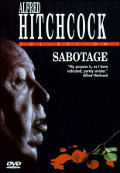
Directed by
Alfred Hitchcock
76 minutes
Rated PG
Reviewed by
Bernard Hemingway

Sabotage
Sabotage is a dated affair and often clumsy as a production but it is of note because it shows the director at his most inventive in the early part of his career. Based on a Joseph Conrad novel called "Secret Agent" it tells the story of a Scotland Yard undercover detective (John Loder) who is on the trail of a saboteur (Oskar Homolka) whose young American wife (Sylvia Sydney) knows nothing of his nefarious activities.
Visiting the ever-popular theme of the dangerous foreigner the film is quite interesting in our post 9/11 and London bus bombing days for its dealing with the theme of terrorism. Homolka is near-laughable as the heavily-accented foreigner, the operator of a small London cinema who for apparently financial rather than ideological reasons is caught up with a clique of terrorists whose purpose we never discover.
Although B-grade material, Hitchcock’s visual inventiveness is exceptional, particular for British film of the time, whilst he is also gleefully murderous, allowing the boy and a busload of passengers to be killed by a terrorist bomb, something which shocked audiences of the time. Hitchcock also indulges his fondness for social observation and there is a good deal of London street life of the times on display as well as the interesting set up of the cinema which acted as a kind of portal to the domestic life of the person of interest and his family (Hitchcock buffs will also point out that the director's parents ran a greengrocer business which is the cover here). Too crude to appeal to modern audiences nevertheless for cinéastes and Hitchcock fans it has enough to offer.
FYI: To avoid confusion with Hitchcock's Secret Agent which was based on a W. Somerset Maugham and which was released earlier in 1936, the film was released in the US as A Woman Alone. He directed a film called Saboteur in1942.
Want something different?





